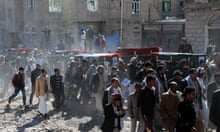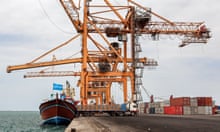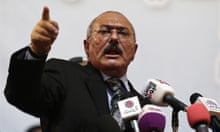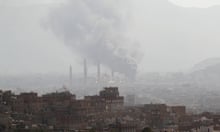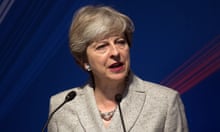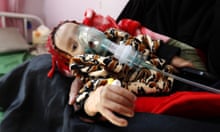Untold thousands of innocent people will die in Yemen unless the Saudi-led military coalition unconditionally lifts it blockade of the country’s ports, the heads of three UN agencies have warned.
In a powerful joint statement the heads of the World Food Programme, Unicef and the World Health Organisation said the cost of the blockade was “being measured in the number of lives that are lost”.
Supplies including medicines, vaccines and food are waiting to enter the country, the agencies said. “Without them, untold thousands of innocent victims, among them many children, will die.”
The plea follows a strongly worded statement released late on Wednesday by the UK Foreign Office that called on all parties to “ensure immediate access for commercial and humanitarian supplies to avert the threat of starvation and disease faced by millions of citizens”.
Western powers are involved in intensive behind-the-scenes lobbying of the Saudis. Talks in London that were due to be held this week between Saudi Arabia, the United Arab Emirates, the US, Oman and the UK have been delayed.
The Foreign Office statement called specifically for the reopening of the rebel-held port of Hodeidah, which is the entry point for 80% of the aid reaching the country.
Quick GuideThe Yemen conflict explained
Show
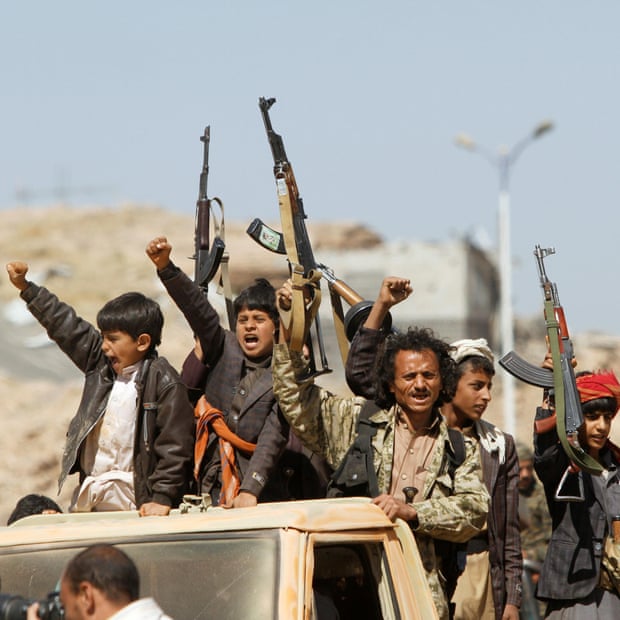
The roots of the Yemen civil war lie in the Arab spring. In 2011 pro-democracy protesters took to the streets in a bid to force the president, Ali Abdullah Saleh, to end his 33-year rule. He responded with economic concessions but refused to resign.
After protesters died at the hands of the military in the capital Sana’a, there followed an internationally brokered deal to transfer power to the vice-president, Abd Rabbu Mansour Hadi.
However, Hadi’s government was considered weak and corrupt, and his attempts at constitutional and budget reforms were rejected by Houthi rebels from the north. They captured the capital, forcing Hadi to flee eventually to Riyadh.
In March 2015 a Saudi-led coalition intervened on behalf of Hadi’s internationally recognised government against the Houthi rebels. The war is widely regarded as having turned a poor country into a humanitarian catastrophe.
Over the years the situation on the ground has become ever-more complex. In September 2019, the Saudi Arabian oil-fields of Abqaiq and Khurais were attacked by air. The Houthis claimed the credit, but Saudi Arabia and the US accused Iran of being behind the attacks. The conflict has been seen as part of the regional power struggle between Sunni-ruled Saudi Arabia and Shia-ruled Iran.
Local militants from al-Qaeda in the Arabian Peninsula and from a group affiliated to Islamic State have both used the opportunity to seize territory in Yemen. In August 2019 the Southern Transitional Council, which has up until that point been seen as a UAE-backed ally, attempted to separate itself from Yemen, sparking conflict with the Saudi-led forces. The UAE has now claimed to have withdrawn from the conflict.
Saudi Arabia had expected that its overwhelming air power, backed by the regional coalition and with intelligence and logistical support from the UK, US and France, could defeat the Houthi insurgency in a matter of months. Instead it has triggered the world's worst humanitarian disaster, with 80% of the population - more than 24 million people - requiring assistance or protection and more than 90,000 dead. The charity Save the Children estimated that 85,000 children with severe acute malnutrition might have died between 2015 and 2018.
Medical facilities have been devastated by years of war. The country has had to deal with not just the coronavirus pandemic, but also the largest cholera outbreak ever recorded, with over 2 million cases on record. The UN office for the coordination of humanitarian affairs has warned that more than 16 million people in Yemen would go hungry this year, with already half a million living in famine-like conditions.
On Monday Saudi Arabia announced it would allow aid to enter ports in areas controlled by Yemen’s internationally recognised government – predominantly Aden, Mocha and Mukalla in southern and western Yemen – but said it wanted discussions with the UN special envoy, Ismail Ould Cheikh Ahmed, on new procedures at Hodeidah.
Saudi Arabia – which has complete control of the skies above Yemen – has said the port is a conduit for arms shipments to Houthi rebels and that it wants guarantees that UN inspectors will stop the shipments before the port can reopen.
More than two years of conflict between a Saudi-led coalition and the Iranian-allied Houthi rebels have devastated Yemen, which is beset by famine and cholera.
Even with the partial lifting of the blockade, the World Food Programme estimates that an additional 3.2 million people will be pushed into hunger. If left untreated, 150,000 malnourished children could die within the coming months.
“To deprive this many from the basic means of survival is an unconscionable act and a violation of humanitarian principles and law,” the joint UN statement said.
On Wednesday Save the Children said an estimated 130 Yemeni children or more died every day from extreme hunger and disease, and that the continuing blockade was likely to increase the death rate. More than 50,000 children are believed to have died in Yemen so far in 2017, the international aid group said.
The blockade was imposed on 6 November following the firing of a missile at Riyadh from rebel-held territory in Yemen, which Saudi Arabia claims was supplied by Iran. It has led to UN aid backing up on Yemen’s borders, and a sudden escalation of fuel prices that in turn will mean electricity generation, and the supply of clean water, will be reduced.
The Saudi blockade was condemned this week in the European parliament, and in a largely declaratory vote in the US Congress.
The Foreign Office statement said it shared Saudi concern about the security threat posed by ballistic missiles and the need to stem the flow of sophisticated weaponry into Yemen, including the importance of effective monitoring and controls. But it stressed the arms embargo could not be enforced so fiercely that no humanitarian aid reached Yemen.
Shane Stevenson, Oxfam’s country director in Yemen, said: “If those with the power to act fail to do so, history will judge these countries as either responsible or complicit in the unnecessary deaths of thousands of people in Yemen. They need to immediately open borders, and allow the free flow of vital aid and help secure a ceasefire.”
There have also been reports that the UAE, an ally of the Saudis in the two-year Yemen civil war, has cooled its support for President Abd-Rabbu Mansour Hadi, the leader of the UN-recognised government, which has been in Riyadh for months. UAE officials have discussed the possibility of appointing a vice-president who would in effect take over many of his powers, and circumvent what they regard as his inability to take a grip of the political situation.
There have even been suggestions that Hadi is being prevented from returning to Yemen and is being kept hostage or under house arrest in Riyadh, a charge denied by Saudi Arabia.

